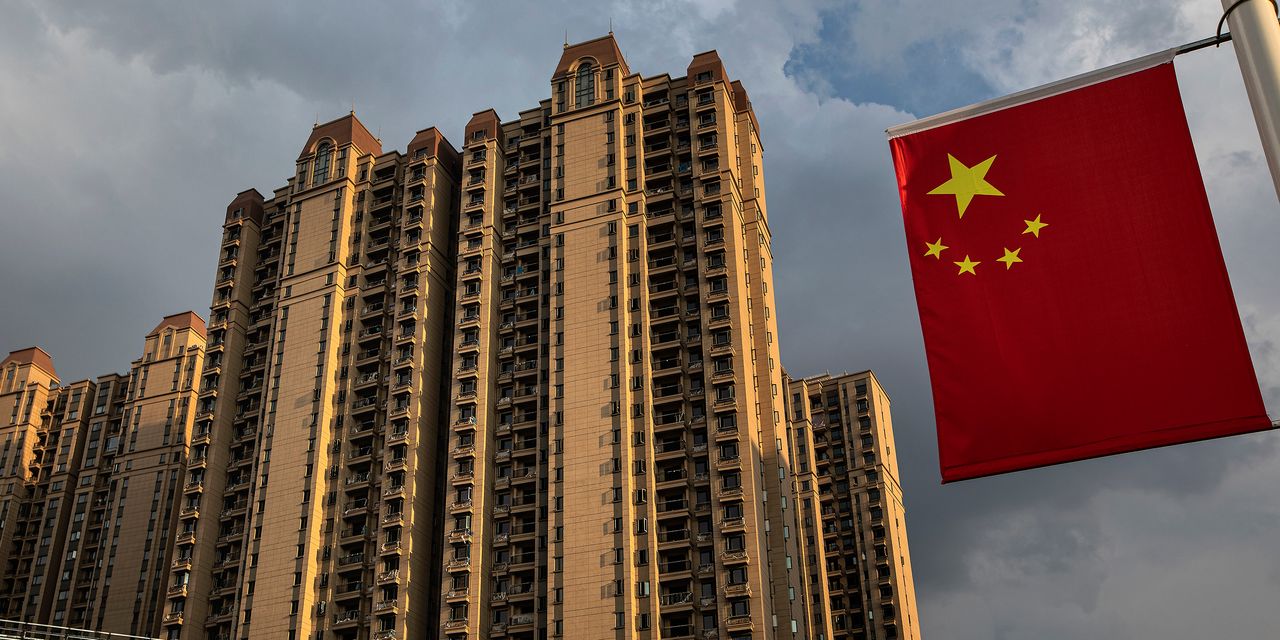China’s
Country Garden
suspended trading in some of its corporate bonds, the latest sign of woes in the indebted property sector weighing on the world’s second-largest economy. There are even further signs of risks brewing in other parts of the Chinese financial system.
Country Garden (ticker: 2007.H.K.) announced in stock exchange filings Sunday that it suspended trading in 10 of the company’s corporate bonds, further raising fears about the health of China’s largest surviving real estate giant.
The developer’s bonds are trading at deeply distressed levels, with the recent moves adding to the gloom that started last week when Country Garden missed interest payments on some dollar bonds.
Shares in Country Garden sank 18.4% on Monday, extending losses for the stock, which is down some 50% this month alone. The plunge heaped pressure on Hong Kong’s
Hang Seng Index,
which retreated 1.6%, and soured sentiment across Asian trading. Other Chinese real estate stocks also notched deep losses, with the Hang Seng Properties Index shedding 2.4% and
China Jinmao Holdings
—which issued a profit warning late last week—dropping 4.1%.
Chinese developers took on massive debt over the past couple of decades to fuel fast expansion as China’s population boomed. An economic slowdown, triggered by the pandemic and fueled by the government’s zero-Covid policy, catalyzed the sector’s financial problems, with an anticipated recovery in 2023 largely failing to materialize.
Many Chinese property groups have collapsed since 2021, with the meltdown of China Evergrande two years ago setting off a string of failures across the sector. Country Garden, long viewed as a relative haven among investors, is the latest under pressure at a time when China’s slowing economy is in the global spotlight. Worries over China’s economy, and investors’ muted response to government stimulus, hit the U.S. stock market last week, weighing on the
Dow Jones Industrial Average
and
S&P 500.
There are further signs that real estate troubles may be rippling across the Chinese financial system and risking wider spillover, at least in the short term.
Two Chinese companies said they had failed to receive payments due from Zhongrong International Trust, Hong Kong’s South China Morning Post newspaper reported, citing filings with the Shanghai stock exchange. Zhongrong is a unit of Zhongzhi Enterprise Group, which is one of China’s largest private wealth managers and a sprawling financial conglomerate that is an influential creditor to property groups.
The situation at Zhongzhi is compelling evidence that China’s property crisis extends beyond towering apartment blocks, risking spillover at the heart of the country’s opaque financial system at a time when stimulus has done little to stem the bleeding. Precedence from
Evergrande’s
collapse—which rocked global markets—suggests that the response to the situation in China represents a downside risk for investors that may not yet be fully priced in. However, that doesn’t mean it’s time to panic.
“State backstops can probably be relied upon to prevent a full-blown Chinese credit crunch—for all its flaws, this is one advantage of having a tightly controlled financial system versus a more free-market system,” Jennifer McKeown, chief global economist at Capital Economics, wrote in a note. “All of that is probably why the reaction in global financial markets has been fairly muted.”
Yet Country Garden’s woes highlight what could be the start of a sea change in China. The world’s second-largest economy appears to face a profound economic challenge beyond the property sector—from slowing consumption, deflation, and a nascent demographic crisis. It remains to be seen the extent to which stimulus can mitigate the impact on the real estate sector as well as connected entities in the Chinese financial system or even other giants of corporate China, like tech behemoth
Alibaba
(BABA).
“The developer’s problems are indicative of a structural downturn which will shape the global economy for years to come,” said Capital Economics’ McKeown. “China’s construction sector is in structural decline which policymakers will be unable to prevent. This will contribute to a slowdown in its GDP growth to 2% by 2030, which is a key theme that has long shaped our long-run global forecasts.”
As market participants remain divided on the severity of China’s economic outlook, Country Garden—let alone any troubles at Zhongzhi—add weight to the case for caution on China. Even if this doesn’t move the stock market much in the short term, it could be a harbinger of long-term trends.
Write to Jack Denton at [email protected]
Read the full article here




